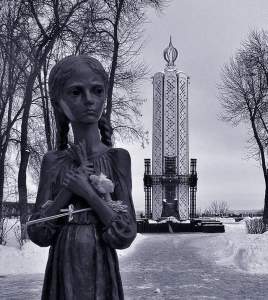
On Saturday 23 November, our 11AM Divine Liturgy will be followed by panakhyda (memorial prayers) for the victims of the Holodomor, the genocidal famine imposed on the Ukraine in the early 1930s.
This year, our prayers are joined for the first time with official commemoration of the anniversary of the Holodomor in the British Columbia Legislature, as instituted in the recently adopted provincial legislation recognising the fourth Saturday in November as Ukrainian Famine and Genocide Memorial Day. The legislation was introduced by the leader of the BC Green Party, Andrew Weaver, who is of Ukrainian heritage on his mother's side. The bill was unanimously adopted by the legislature.
✙ ✙ ✙
BILL M 225 – 2019
UKRAINIAN FAMINE AND GENOCIDE (HOLODOMOR) MEMORIAL DAY ACT
WHEREAS the term ‘Holodomor’ means extermination by means of starvation, and is based on the Ukrainian words ‘holod’, which means hunger, starvation or famine, and ‘moryty’, which means to induce suffering, to kill or to exterminate;
AND WHEREAS the Holodomor refers to an act of genocide and a campaign of deliberate starvation against the Ukrainian people committed by the Soviet state in 1932 and 1933;
AND WHEREAS the purposes of this Act are to recognize the millions of Ukrainians and others who perished during the Holodomor and to provide an opportunity to reflect on the enduring lessons of the Holodomor and other crimes against humanity;
AND WHEREAS the fourth Saturday in November has, in past years, been proclaimed Holodomor Memorial Day in British Columbia with reference to the Ukrainian Famine and Genocide ("Holodomor") Memorial Day Act (Canada), this Act would allow the day to be memorialized by the Legislature;
AND THEREFORE HER MAJESTY, by and with the advice and consent of the Legislative Assembly of the Province of British Columbia, enacts as follows:
Ukrainian Famine and Genocide (Holodomor) Memorial Day
1 To memorialize those who perished as victims of the Holodomor, the fourth Saturday in November in each year is Ukrainian Famine and Genocide (Holodomor) Memorial Day throughout British Columbia.
Commencement
2 This Act comes into force on the date of Royal Assent.
Explanatory Note
This Bill recognizes the Ukrainian Famine and Genocide (Holodomor) of 1932-1933. The term ‘Holodomor’, a Ukrainian word that means ‘extermination by means of starvation’, is used to describe the famine and genocide that killed millions of Ukrainians and others during the period of forced collectivization in the Soviet Union. The Holodomor was deliberately planned and executed by the Soviet regime to systematically destroy the Ukrainian people's aspirations for a free and independent Ukraine. No fewer than 4.3 million people, and possibly as many as 10 million, died during the Holodomor.
Today, some of the survivors of the Ukrainian Famine and Genocide (Holodomor) of 1932-1933 and their descendants reside in British Columbia. They have contributed greatly to British Columbia's cultural, economic, political and educational life.
The Government of Ukraine, the Parliament of Canada, the provincial legislatures of Alberta, Saskatchewan, Manitoba, Ontario and Quebec, UNESCO, the United Nations, the United States House of Representatives and the United States Senate, the European Parliament and over 40 other jurisdictions worldwide have officially condemned the Holodomor or recognized it as a genocide.
The Government of Ukraine has declared the fourth Saturday in November as the day to commemorate the Ukrainian Famine and Genocide (Holodomor) of 1932-1933. The Parliament of Canada and other Canadian legislatures have followed suit. With this Bill, the Province of British Columbia officially recognizes the importance of commemorating this event.
